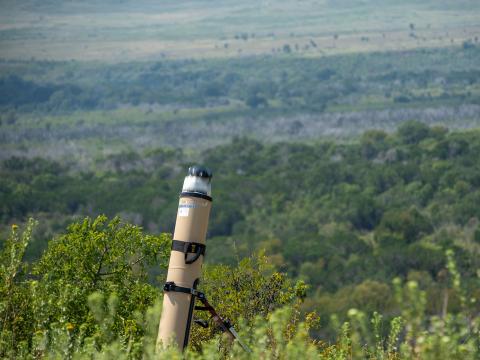Mobile Pushes Past Accreditation Challenges
The effort to field mobile devices down to the squad level continues as the U.S. Defense Department certifies security credentials for the iPhone and Android operating systems. However, the arduous accreditation process still poses many hurdles for the military as it moves toward a more mobile communications environment.
The effort to field mobile devices down to the squad level continues as the U.S. Defense Department certifies security credentials for the iPhone and Android operating systems. However, the arduous accreditation process still poses many hurdles for the military as it moves toward a more mobile communications environment.
In the latest issue of SIGNAL Magazine, Technology Editor George I. Seffers discusses the challenges ahead in his article, "Accreditation Recharges Smartphone Deployments."
Col. Earl Noble, USA, project manager for network enterprise services, Program Executive Office Enterprise Information Systems, is tasked with helping the U.S. Army push new systems and devices through the accreditation process. This year, the colonel expects to complete the process for the Dell Streak and for the iPhone and Android operating systems-a step that brings the military closer to fielding mobile devices across the entire department.
In addition, Col. Noble relates that the Army's use of the Microsoft 2010 Enterprise Exchange managed email service hosted by the Defense Information Systems Agency (DISA) could foster a more cohesive mobile environment. The program allows users to access their email box from any computer enabled with a Common Access Card (CAC) capability:
"I think you're going to see momentum really pick up over the next year. Once DISA enterprise email becomes more widespread, it will be easier to adapt mobile solutions because it will be one-stop shopping at that point. You'll have just one email to interface with, so I think it's going to get faster and faster."Col. Noble's office also developed a secure email application for Windows Mobile and adapted it for the iPhone and Android operating systems. By modifying commercially available Good Mobile Messaging software, the program provides standard email features and important additions such as encrypting:
"That's our pride and joy, that little app. It has security built into it. We like to say that what happens in the app stays in the app."In addition, Col. Noble's office developed a CAC reader that works with any device featuring a Bluetooth radio capability. "This is our identity on the CAC card," the colonel says, and the ability for a device to work with a CAC reader is one of the standards that must be met for all products moving forward. While Col. Noble says he cannot estimate how long it might take to field mobile devices to individual soldiers, he knows one thing for certain: the process is not going fast enough. The colonel asserts that the community needs to come together and speed up the acquisition process by readdressing the workload and possibly developing a new contract vehicle that would allow vendors to compete for task orders under a single umbrella contract. Despite the challenges ahead with policies and other mobile device issues, Col. Noble says he sees an abundance of opportunities. "I tell people this is the time to really get excited, because it's just the beginning."




Comments